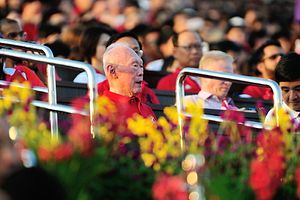Earlier this week, the Asia-Pacific lost one of its foremost figures. Singapore’s Lee Kuan Yew, the doyen of Singaporean politics and one of the models for those pushing modern autocracy, died at the age of 91. As made evident by the hagiography out of Washington and Brussels, Lee’s presence and governance – producing social stability, economic development, and gum-free streets – will be missed in certain circles.
It is the autocrats, however, who may mourn Lee’s passage the most. From Rwanda to Riyadh, from Belarus to Beijing, illiberal governments consistently cited Lee’s Singapore as a political lodestar. Lee displayed a putative third way: the twinning of hard-fisted autocracy with streamlined economic growth, foregoing any liberal niceties or necessities along the way. Central Asia, to be sure, was no different from the Eastern European or East Asian governments citing Lee’s model as one worth emulating. And it’s entirely possible that no government official will mourn Lee’s passing more than Kazakhstani President Nursultan Nazarbayev.
For years, Nazarbayev has cited Lee’s Singapore as one of the best socio-political models. Nazarbayev has gone so far as to label Lee, along with France’s Charles de Gaulle, as one of two “eminent founding statesmen” worth emulating. Certain parallels between Kazakhstan and Singapore are, indeed, evident: Neither nation sought outright independence from its former benefactor, and both Singapore and Kazakhstan boast an ethnic mix that is far from unified.
As Lee’s legacy solidified, Nazarbayev began citing the Singaporean that much more. According to biographer Jonathan Aitken, Nazarbayev’s notion for the “Samruk group of industries grew out of [Lee’s] blueprint.” The Kazakhstani president, up for yet another presidential term in April, continued citing Lee’s political model earlier this month:
“The founding father of Singapore, Lee Kuan Yew… once stepped down, and I asked him why. And the answer was: ‘I had ruled for 31 years, and when I watched myself on television, I did not like myself.’ And I said that television distorts things and that well, maybe it’s not worth watching TV, but I have a similar plan.”
Nazarbayev, of course, promptly followed this anecdote by announcing he would be standing yet again for the presidency. Part of this choice stems from the realities of a snap election without a tapped successor – but part, presumably, also stems from another of Nazarbayev’s beliefs about a Lee-style presidency. As Nazarbayev once said, Lee illustrated the apparent importance of enacting economic reformation before offering political liberalization. Pointing to Lee’s model, Nazarbayev said, “The middle class will not emerge without a sustainable economy which cannot exist without a sufficiently strong and wise leadership capable of getting the country out of free-fall.”
This is by no means a point relegated solely to Kazakhstan’s governance; this line of logic is used throughout the region to excuse the lack of political liberalization. And considering the dark clouds on Kazakhstan’s economic horizon, Nazarbayev may well realize that his best chance for crafting a sturdy middle class – the kind that could then beget the political liberalization that still hasn’t reached Singapore – is behind him. This, then, is the risk behind Lee-style governance, which Nazarbayev has thus far failed to heed. It’s fine and good to swap economic growth for political liberalization. But – and we’re watching this unfurl in Russia – the former does not necessitate the latter. And when the economic bon temps come to a close, the seemingly sturdy model Lee brought to the fore begins looking more like a hollow excuse for autocracy.

































